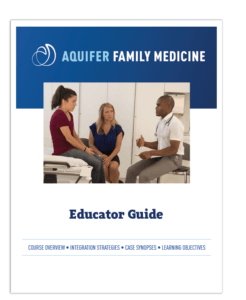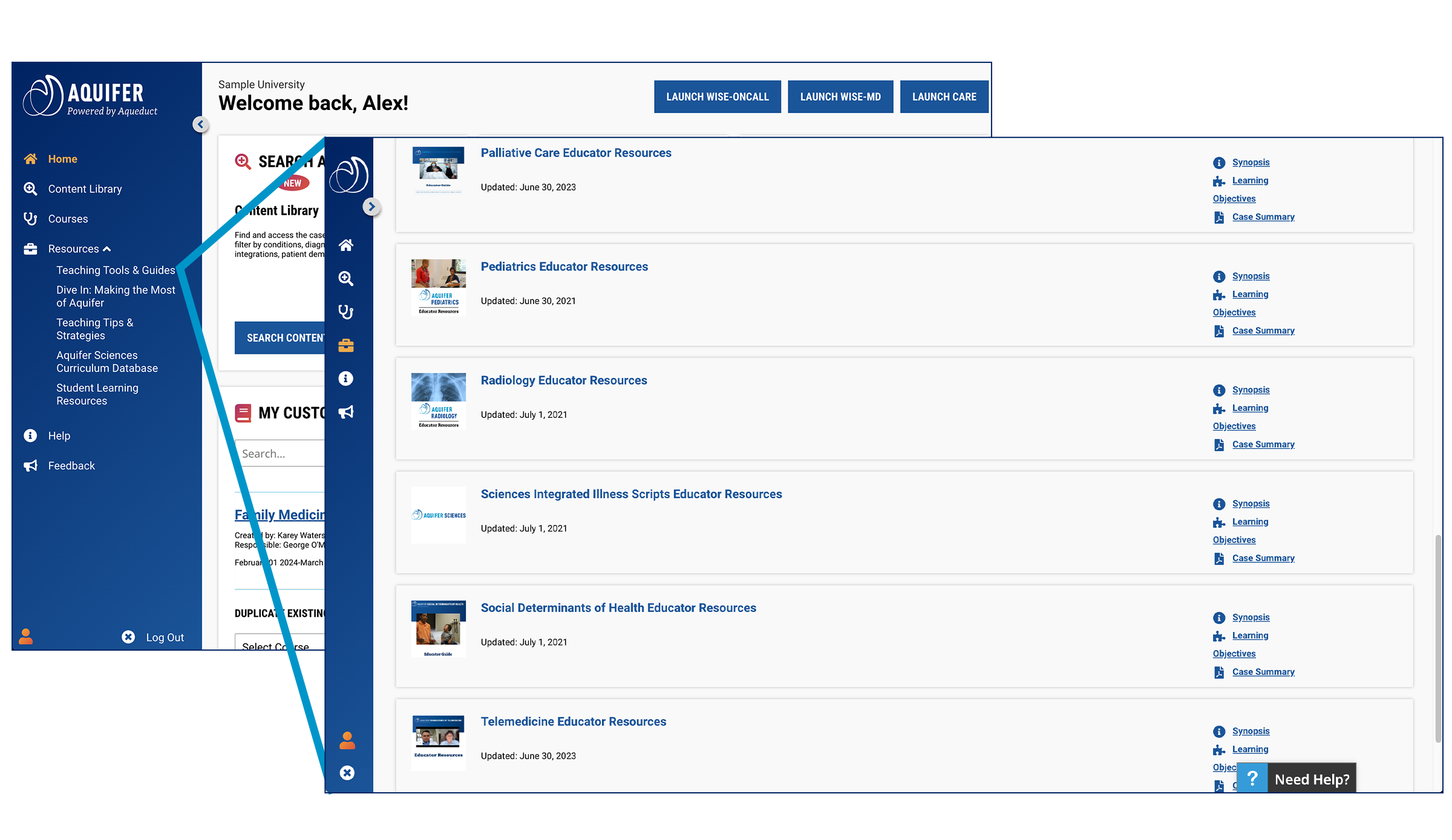Aquifer provides fully-developed teaching tools and complete Educator Guides to help faculty quickly get up to speed, or optimize the way they are using Aquifer cases in their course or clerkship. The guides and tools below are ideal for:
Get started using Aquifer
for new staff members or new subscribers.
Discover best-practices and new ideas
for integrating Aquifer into your course or curriculum.
Take advantage of free resources
included with your subscription.
Quick Case Guides
Each Aquifer signature course includes a quick reference guide that provides faculty with a quick list of case names and numbers with differential and final diagnoses, making it fast and easy to select the cases you need to assign to students.
Complete Educator Guides

All Educator Guides include course and pedagogy overviews, integration strategies, feature overviews, case details, and direct links to any course-specific teaching tools. Educator Guides are available for:
- Family Medicine
- Geriatrics
- Internal Medicine
- Pediatrics
- Neurology
- Radiology
- Diagnostic Excellence
- High Value Care
- Social Determinants of Health
- Foundations of Telemedicine
- Excellence in Palliative Care
- Trauma-Informed Care
- Integrated Illness Scripts
Ready-to-Use Online Teaching Tools
The Aquifer Educators Consortium has developed a range of in-depth learning activities ideal for virtual teaching or group discussions. These resources extend the learning in the associated Aquifer cases.
Interdisciplinary Courses
Robust tools are available to all programs
Embedded in the Educator Guide for this course, you’ll find suggestions for real-world active learning strategies for every case, including fully-developed group sessions and suggested discussion questions.
The six cases in this course each include activities designed as 60-minute classroom sessions to accompany. Classroom strategies include a rich array of activities, reflection questions for discussion, and worksheets, and more.
The Social Determinants of Health Active Learning Session focuses on reinforcing and extending concepts presented in the SDOH Cases to another scenario and, if applicable, the learners’ own experiences. The session is designed to take 60 minutes.
Active Learning Session resources include a facilitator’s guide, power point, discussion questions, and handout.
The Aquifer Telemedicine Educator Guide provides an overview of the course pedagogy, strategies for integration, and a description of each of the four cases.
Signature Courses
In-depth teaching tools available with your program’s subscription to the corresponding signature courses.
The Aquifer Case Analysis Tool is a structured worksheet to be completed by the student as they work through an Aquifer case, designed to enhance the development of clinical reasoning skills. A full guide for course/clerkship directors is included! Although built for Aquifer Pediatrics, the Case Analysis Tool can be used with any Aquifer Family Medicine, Internal Medicine, and Geriatrics cases.
The Case Analysis Tool is available with subscriptions to Aquifer Pediatrics.
Signature Courses
In-depth teaching tools available with your program’s subscription to the corresponding signature courses.
Aquifer Radiology Flipped Classroom Workshops are available for 18 cases—with speaker notes. Each workshop, designed to be completed in a 60-90 minute session, includes a powerpoint with images and annotations, speaker notes, and a facilitator guide.
Aquifer Pediatrics Active Learning Modules cover pediatric immunizations, fever, patient safety, and child development. These application exercises, complete with facilitation guides, have been thoughtfully prepared with the aim of minimizing teacher preparation time and maximizing learner achievement.
Aquifer Pediatrics Questions for Further Consideration extend student learning beyond the cases. This resource can be used by assigning the same application questions to teams, or assigning similar but different questions to different groups and having students teach each other at the end.
Integrated Illness Scripts
Take cognitive integration to the next level.
If your program has access to Integrated Illness Scripts, you can find deep resources in the Sciences Educator Resources section of your Aquifer account to help you make the best use of the scripts. Along with an Educator Guide, you also have access to our Integrated Illness Script Activity Cards.
These activities are designed to be used with Aquifer Integrated Illness Scripts and Mechanism of Disease Maps to make it easy for faculty to support students learning basic science causal mechanisms of disease. These efficient activities range from 5 to 30 minutes and are ready to use, requiring little to no faculty prep time.
Integrated Learning Sessions (ILS) are active learning sessions with step-by-step instructions, writable handouts for students, and answer keys for the educators. The goal of the ILS is to encourage the transfer of basic science core concepts to clinical application and improve diagnostic decision-making and reduce patient harm. These 90-minute sessions include a facilitator’s guide, student handout, and answer key.
Osteopathic Educator Resources
Aquifer has educator resources specifically designed for Osteopathic programs which emphasize osteopathic approaches to diagnosis and treatment. These Active Learning Modules help Osteopathic faculty maximize their use of Aquifer cases in the curriculum. Each resource includes a Facilitator Guide with instructions, prompts, materials for learners, and additional resources. These resources are available to all subscribing osteopathic programs.
Find Guides & Tools
To access this resource, sign in to Aqueduct and open the resources tab on the left-hand side of the screen. Click on “Teaching Tools and Guides.” The Educator Resources page shows all of the resources available for your program’s subscribed courses and free interdisciplinary courses. Click on resources for your desired course to view and/or download resource files.

